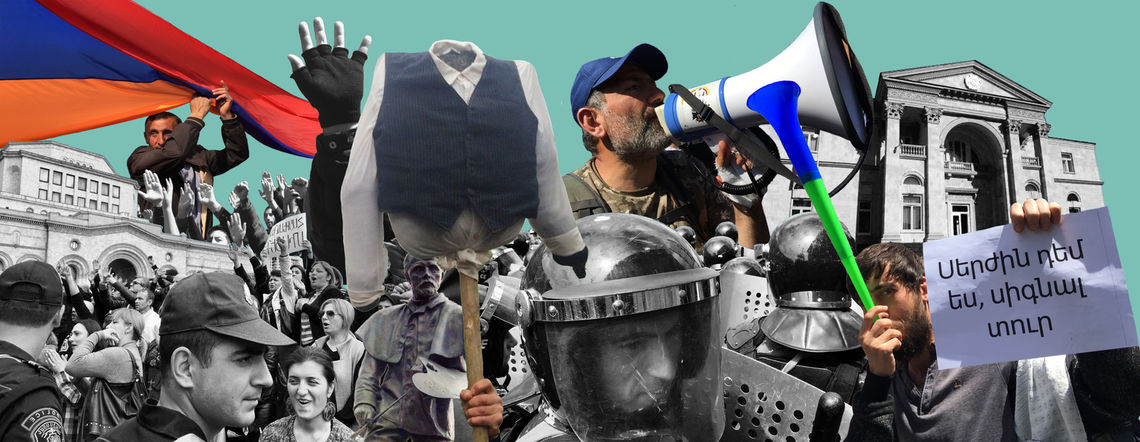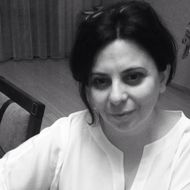
It is “tomorrow” in Yerevan time, because the saying from 1988, “Long live the Armenia that will come tomorrow,” seems to have arrived. It has arrived because in the years following the Karabakh War, there was no civil society and now, for the first time, it has won. Thereby, it is “tomorrow” in Yerevan time.
I came out into the streets and became a participant of the April 2018 disobedience movement because of my children who are students. I have been both an active participant or a concerned observer of all movements of the Third Republic of Armenia. On the very first day of this movement, I told my children, “Thirteen people don’t make a revolution.” Their response was short and confident, “They do.”
I was wrong. I’m happy I was mistaken, because the new generation was right. When the new generation is right, then the process moves forward.
Those days in April, when the civil disobedience rally moved from France Square to Republic Square, there weren’t very many participants. On my way to the rally, I noticed that many people were walking in the opposite direction; while we moved towards Republic Square, they moved away from it. My daughter, who was an unconditional devotee of the student movement from the first day asked, “When will the movement win?” I answered, “When there is no one moving in the opposite direction from the rally.” This time I was right. Real victory was registered when the people’s flow towards the Square was such that even if someone needed to move in the opposite direction, it would have been extremely difficult.
I have known Nikol Pashinyan since he was a student and initially I only knew him as a talented journalist. At times, I have been critical of him and other times I’ve often been positively predisposed. I’m not at an age to be creating idols, and for that I’m happy. I welcomed his peaceful disobedience campaign from the start.
We had exiled ourselves from our country but had physically remained here.
To now see Nikol at Baghramyan 26, from where our Republic has always been ruled, where the most critical and most cruel orders, decisions and appointments have been conceived and announced, I’m having difficulty choosing the right words. It is inexplicable and not because he is unprepared or because I have lost myself to delight, no. None of the people who moved to Baghramyan 26 were particularly prepared or equipped for the role of the president, and it is unclear if they became better equipped during their time in office. Probably, the inexplicable is primarily in the fact that, for decades, we had gotten used to seeing people in that capacity who we did not want or accept. We had gotten used to demanding their resignation and then hopelessly waiting for that resignation to happen. That particular address has always carried an element of rejection, the the very word - reject - that Nikol Pashinyan turned into a slogan. Then all of a sudden, we see Nikol there, and he establishes a reciprocal connection through his LIVE videos with those, who as he puts it, “have delegated him to Baghramyan 26.”
Nikol gifted us victory, certainly, but he also returned to the people a forgotten state of being. Decades of authoritarian governance had created in the citizen a fundamental state of non-participation in political and civic life and this non-involvement became an intrinsic part of our psychology. We had gotten used to believing that whatever was happening around us did not concern us because we were deprived of the tools to change things. We had exiled ourselves from our country but had physically remained here. We were migrants in our own country. At one point, this made our lives easier to the extent that we were not worried about anything other than the military operations that our children were participants of. As citizens we had freed ourselves from being concerned with what was happening in government and retreated into our own personal space.
After the victory of the disobedience movement, all of a sudden, we found ourselves nervous about every word, behaviour, opinion. The leaders of the movement do not feel this yet, because they have the love and enthusiasm of the people. However, the citizens of Armenia, who for a long time, never had their real elected leader and team, are feeling responsible for every expression, appointment, action. This is very heavy burden and uncustomary. We achieved victory and lost the “lightness” of indifference towards everything. We now have some hope that one day the government will be so established that it will function effectively on its own and we will free ourselves from the burden of being concerned for its every step.
In reality, none of us knows how the life of the state and consequently our lives will be shaped. But today we have achieved one very important obligation - we are once again healthy citizens, we are indifferent towards nothing.
In return for this loss of “lightness,” citizens will be demanding of leaders who for now enjoy only love and admiration. Those who were peaceful disobedients for a long time or since forever, will be demanding. Those who wholeheartedly and suddenly became active participants of the disobedience movement, what was given to them as a grand gift, who are still cherishing the newly elected prime minister, who are unforgiving towards any constructive criticism or proposition coming from his old friends, will be demanding. All of a sudden, the youth have a leader they love and admire and they are not tolerant of any, even important and honest, criticism. This will pass.
This victory is a very heavy responsibility.
In reality, none of us knows how the life of the state and consequently our lives will be shaped. But today we have achieved one very important obligation - we are a concerned part of our government, we are once again healthy citizens, we are indifferent towards nothing. And this “we” is the dominant majority, inclusive of social, educational layers, people of all different views.
In the shops of the city, people are discussing what will come next. Taxi drivers in front of supermarkets are discussing the resolution of the Artsakh conflict, they are saying reasonable things. The most apolitical people of the city are now interested in the future. This is the stage where our bond with the country is being restored. We don’t know what will happen next. But the fact that in his live video segments, the prime minister responds to people’s objections regarding new appointments is new to us and so far we are benefiting from it. We don’t know what will happen next but now, we are where we want to be, a place where our concerns get immediate responses. We used to express not only our dissatisfaction but also our misery on the same social media platforms and would never get a response or even a reaction.
On the day of the prime minister’s election, the city was celebrating. Our city has a tradition and a rich agenda of artificial celebrations. No one would be particularly joyous during these celebrations, but the city would be decorated, ribbons would be waving, students would be brought out to the streets. But on the day of Nikol’s election, people were dancing under the pouring rain for hours, there were tables laid out on the streets, strangers were embracing one another, overcome with emotion, the accordion and the clarinette were playing late into the night in the city and no one was complaining.
Only those who had managed to live well under the previous regime were complaining of a headache.
During the celebration, an exuberant young man yelled out to a police officer sitting in a car across the street, “Congratulations, Mr. Officer!” The officer accepted the congratulations with a polite nod. This seemed familiar to me. I tried to recall where I had heard these words uttered with the same tone and in the same context.
And then I remembered an Armenian movie I had seen long ago called “Yerevan Jan.” I’m not sure why I had liked it so much and whenever I had recommended people watch it, they would always ask why. I can’t say, but I liked it. It was not a very good movie but it had fragments that were true representations of nuances specific to Yerevan and there were humorous parts that actually made me laugh out loud. The movie was about saving a city that was sick; Yerevan. The main character is a man with a family in economic hardship. The father of the family is a painter who hits bad and dishonest people in the head with a hammer and he does this as his job, the son hits them in the eye with a sling.
At the end of the movie, when the heroes have won and the city is saved, the officer, who in the beginning of the movie is a character frustrated by his boss and is harsh with the citizens, has the following interaction with the main character.
“Hello officer jan.”
“Hello. Can I say something? I think our city no longer need police officers.”
“You could start writing poetry.”
“Who, me?” And the officer starts reciting a poem, “In these unique days, hardened by blows …”
There was something mystical about this movie that was rebuked by cinema critics. At the end, the bearded president appears, he is loved by everyone and loves everyone in return. The main character asks, “Dear president, the people want to know, is this a dream or is it real?” The bearded president answers, “We’ll live, we’ll see.”



